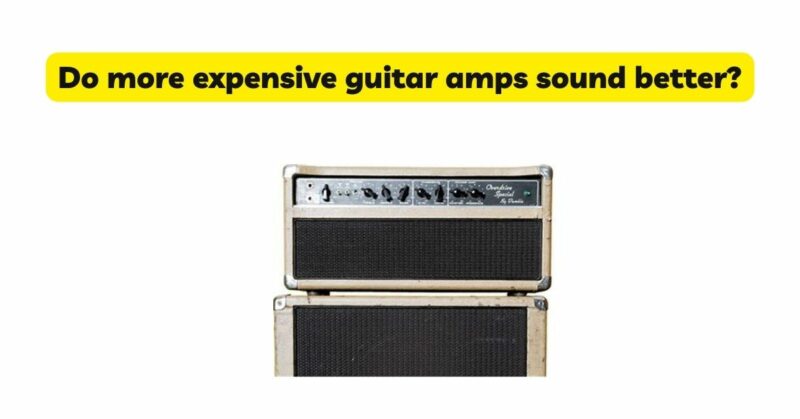When it comes to guitar gear, the price tag often raises questions about quality and performance. Guitarists, both seasoned players and beginners, may wonder if investing in a more expensive guitar amp is worth the cost. Does the price reflect superior sound quality, enhanced tonal characteristics, or advanced features? In this article, we aim to demystify the notion that more expensive guitar amps inherently sound better. By exploring the factors that contribute to sound quality, examining the relationship between price and performance, and considering individual preferences, we will shed light on whether spending more on a guitar amp truly guarantees a superior sonic experience. So, let us embark on this journey and uncover the truth behind the correlation between price and sound quality in guitar amplifiers.
I. Understanding Sound Quality in Guitar Amps
Before delving into the relationship between price and sound quality, it is crucial to understand the factors that contribute to the overall sound of a guitar amplifier.
- Circuit Design and Components: The circuit design and quality of components used in an amplifier can significantly impact its sound. Factors such as the type and quality of tubes or transistors, the design of the preamp and power amp stages, and the overall build quality play a vital role in shaping the amplifier’s tonal characteristics.
- Speaker Configuration: The speaker(s) within a guitar amp also contribute to the overall sound. Different speaker sizes, types, and construction materials can affect the amp’s frequency response, projection, and overall sonic character.
- Tone Controls and Features: Guitar amps often include tone controls, EQ settings, and various built-in effects. These features allow players to shape their desired tone and add texture to their sound. The quality and versatility of these controls can influence the overall sonic capabilities of the amplifier.
II. The Relationship Between Price and Performance
While there are exceptions, it is commonly believed that more expensive guitar amps offer superior sound quality and performance. However, the relationship between price and performance is not always straightforward.
- Build Quality and Components: Higher-priced amplifiers often incorporate better build quality and higher-grade components, which can contribute to improved reliability, longevity, and overall performance. These factors can positively impact the amplifier’s sound quality and tonal characteristics.
- Research and Development: High-end guitar amp manufacturers invest significant resources in research and development to refine their products. This investment can lead to innovative designs, improved circuitry, and enhanced sound reproduction. Consequently, the extra cost may reflect the advancements and expertise incorporated into the amplifier’s development.
- Boutique Amplifiers: Boutique amplifiers, often handcrafted by skilled artisans, command premium prices due to their meticulous craftsmanship and attention to detail. These amplifiers are often lauded for their unique tonal characteristics, customization options, and exclusivity. However, it is important to note that boutique amplifiers may not necessarily outperform all mass-produced amplifiers in terms of sound quality.
- Diminishing Returns: As the price of a guitar amp increases, the incremental improvement in sound quality may not always match the increase in cost. While higher-priced amps may offer nuanced tonal differences and enhanced features, the improvements may not be significant enough to justify the substantial price difference for all players.
III. Individual Preferences and Subjectivity
\Sound perception is subjective, and what sounds great to one person may not resonate with another. Preferences for tone, genre, playing style, and personal playing goals all play a significant role in determining what constitutes a “better” sound.
- Personal Taste and Musical Style: The sound quality that one player finds appealing may not be universally desirable. Different guitarists may gravitate towards distinct tonal characteristics based on their musical genre, playing style, and personal preferences. A more expensive amplifier may not necessarily align with a player’s sonic preferences.
- Skill Level and Context: A player’s skill level and performance context should also be considered. While experienced players may be able to discern subtle tonal differences, less experienced players may not benefit as much from high-end amplifiers due to the need for honed technique and a discerning ear.
- Room Acoustics and Sound Engineering: The environment in which an amplifier is used, including room acoustics and sound engineering techniques, can significantly influence the perceived sound quality. Factors such as room size, reflections, and mic placement can impact the amplifier’s sound, regardless of its price.
Conclusion
While it is tempting to assume that more expensive guitar amps sound inherently better, the reality is far more nuanced. Factors such as circuit design, components, speaker configuration, and personal preferences all contribute to the perceived sound quality of an amplifier. While higher-priced amplifiers often offer superior build quality, advanced features, and refined tonal characteristics, the relationship between price and sound quality is not always linear. It is essential for guitarists to consider their individual needs, musical preferences, and playing context when investing in an amplifier. Ultimately, the “better” sound is subjective and varies from person to person. It is advisable to test various amplifiers across different price ranges and trust one’s ears to find an amplifier that resonates with their unique musical vision. Remember, the price of an amplifier should be viewed as one factor among many, and the ultimate goal is to find an amplifier that inspires and enhances one’s musical journey.


